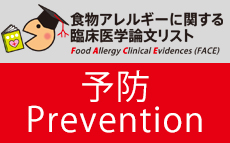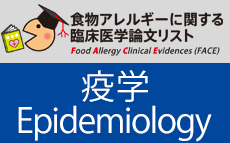乳幼児のアレルギー予防におけるプレバイオティクス/Prebiotics in infants for prevention of allergy
更新日:2016年10月21日
| Author: | Osborn DA, Sinn JKH |
|---|---|
| Title: | Prebiotics in infants for prevention of allergy (Review) |
| Citation: | Cochrane Database Syst Rev. 2013 Mar 28;3:CD006474. doi: 10.1002/14651858.CD006474.pub3. |
| URL: | https://pubmed.ncbi.nlm.nih.gov/23543544/ |
| Abstract: | Background Prebiotics (commonly oligosaccharides) added to infant feeds have the potential to prevent sensitisation of infants to dietary allergens. Objectives To determine the effect of prebiotic given to infants for the prevention of allergy. Search methods We performed an updated search in August 2012 of the Cochrane Central Register of Controlled Trials (CENTRAL) (The Cochrane Library 2012, Issue 8), MEDLINE, EMBASE, conference proceedings, citations, expert informants and clinical trials registries. Selection criteria Randomised and quasi-randomised controlled trials that compared the use of a prebiotic to no prebiotic, or a specific prebiotic compared to a different prebiotic in infants for prevention of allergy. Data collection and analysis Assessment of trial quality, data extraction and synthesis of data were performed using the standard methods of The Cochrane Collaboration. Main results The 2012 update identified 13 studies classified as ongoing or awaiting classification (yet to report allergy outcomes). Forty-three studies were excluded, primarily as no allergy data were reported, although none of these enrolled infants were at high risk of allergy. Four studies enrolling 1428 infants were eligible for inclusion. All studies were at high risk of attrition bias. Allergy outcomes were reported from four months to two years of age. Meta-analysis of two studies (226 infants) found no significant difference in infant asthma although significant heterogeneity was found between studies. Meta-analysis of four studies found a significant reduction in eczema (1218 infants, typical risk ratio 0.68, 95% CI 0.48 to 0.97; typical risk difference -0.04, 95% CI -0.07 to -0.00; number needed to treat to benefit (NNTB) 25, 95% CI 14 to > 100; P = 0.03). No statistically significant heterogeneity was found between studies. One study reported no significant difference in urticaria. No statistically significant subgroup differences were found according to infant risk of allergy or type of infant feed. However, indi- vidual studies reported a significant reduction in asthma and eczema from supplementation with a mixture of galacto- and fructo- oligosaccharide (GOS/FOS 9:1 ratio) (8 g/L) in infants at high risk of allergy; and in eczema from supplementation with GOS/FOS (9:1) (6.8 g/L) and acidic oligosacccharide (1.2 g/L) in infants not selected for allergy risk. Authors’ conclusions Further research is needed before routine use of prebiotics can be recommended for prevention of allergy in formula fed infants. There is some evidence that a prebiotic supplement added to infant feeds may prevent eczema. It is unclear whether the use of prebiotic should be restricted to infants at high risk of allergy or may have an effect in low risk populations; or whether it may have an effect on other allergic diseases including asthma. |
| 邦文タイトル: | 乳幼児のアレルギー予防におけるプレバイオティクス |
| 一般向け要約 | 背景:プレバイオティクス(一般的にオリゴ糖)は乳児の食物アレルギー予防効果があるとして食事に添加されていた。 目標:プレバイオティクスを与える事による乳児のアレルギー予防効果を検証する。 検索方法:コクラン臨床試験中央登録データベースやMEDLINE、EMBASEなどを用いて2012年8月に検索の更新を行った。 選択基準:プレバイオティクスと非プレバイオティクスの使用比較、または別のプレバイオティクス同士を比較して乳児のアレルギー予防を検証している無作為比較試験及び準無作為比較試験。 データ収集と解析:試験の質の評価、データ抽出とデータの統合はコクラン共同研究のスタンダードな方法で行った。 主な結果:2012年の更新では13論文が実施中あるいは判断待ちだった(アレルギーの結果はまだ報告されていない)。43論文はアレルギーに関するデータが報告されていないので除外した。合計1428名の乳児が対象の4論文が条件を満たしていた。全ての論文で多くの症例脱落があった。アレルギーに関する効果は4ヶ月〜2年後で検討されていた。 全く違う性質の研究であった2つの研究(乳児226名)でメタ解析をしたが乳児喘息に関して明らかな違いはなかった。4つの研究(乳児1218名)では湿疹の明らかな減少を認めた(リスク比0.68、95%信頼区間 0.48-0.97;リスク差-0.04、95%信頼区間 -0.07~-0.00;必要症例数25、95%信頼区間14~100以上;P=0.03)。これらの研究の性質の違いは統計的に明らかではなかった。1つの研究が蕁麻疹についての有意な効果がないと報告していた。 乳児のアレルギーリスクや摂取方法による統計的な違いは認められなかった。しかしながら個々の研究では、ガラクトオリゴ糖とフルクトオリゴ糖のMixの補充により高リスクの乳児の喘息や湿疹の予防効果が認められ、酸化オリゴ糖(1.2g/L)の補充がアレルギーのリスクに関係なく湿疹の予防効果が認められた。 著者の結論:乳児のアレルギー予防に対してプレバイオティクスを日常的に行うことを推奨する前に、さらなる研究が必要である。プレバイオティクスの補充を乳児に与えることで湿疹の予防になるかもしれないと言う報告はある。プレバイオティックスを使用する事が、アレルギーの高リスクの乳児に限って行うべきか低リスクの乳児にも効果があるのか、喘息を含む他のアレルギー疾患予防にに効果があるのかはいまだ不明である。 |
| 専門医コメント | この論文はプロバイオティクスではなくプレバイオティクスによるアレルギー予防効果を検証した論文です。 一部の論文では喘息や湿疹(=アトピー性皮膚炎)の予防効果を認めていますが、まだ検討が不十分でさらなる研究が必要です。 |


